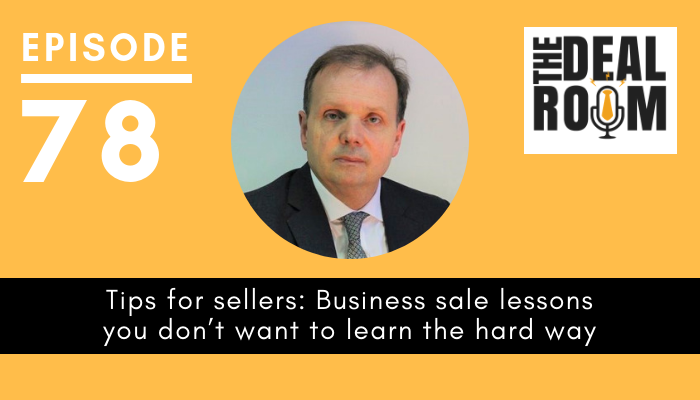
In dealmaking (and in life), much of the knowledge we gain is learned the hard way. But if you can learn the lessons from others who have done it before you, you can free yourself from the pains of committing the same mistake. So that’s what we aim to do in today’s episode as we speak to Michael Mcgrath of Oasis M&A about the lessons he learned from selling his own business.

Episode Highlights:
- My first look at a business sale up close
- Don’t tell the world you’re considering selling the business
- Benefits of getting good representation
- What preparing for an exit is all about
- Have a well-defined plan B
- What to look out for when selling a business
Joanna: Hi, it’s Joanna Oakey here and welcome back to The Deal Room podcast proudly brought to you by our commercial practice, Aspect Legal.
Today we’re launching a new two part series with Michael Mcgrath, the CEO of Oasis M&A here in Australia. For the first part of this series, we’re going to talk about Michael’s own business growth and sale experience, and the lessons he has learnt in hindsight. Then in part 2, we’ll take a closer look at how Oasis approaches M&A transactions differently from other broking firms.
I think this is particularly useful for business owners who are considering an exit through sale into the future, and for brokers and advisors working within this space who are looking at new ways to add value to their clients during the dealmaking process.
So keep listening, and we’ll get right into it.
Joanna: Hi Michael! Thank you so much for coming to talk to us on The Deal Room today.
Michael: Pleasure.
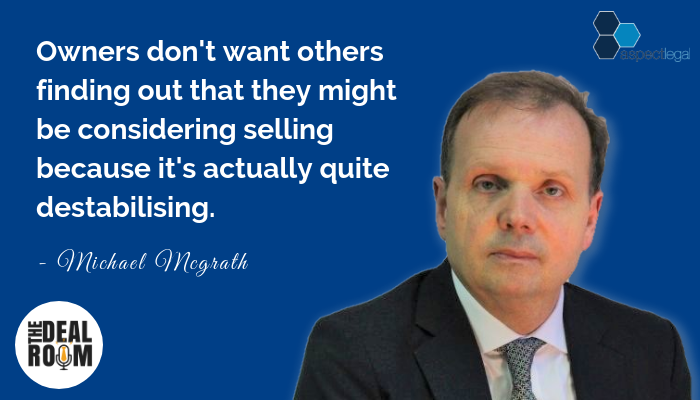
My first look at a business sale up close
Joanna: Great! Now look, we have got so much that I want to talk to you about. We’re recording this in a few different parts so we can provide a few different perspectives of you, Michael, and your different experiences in the area of sales and acquisitions.
But today, for this episode, I’d really like to start with your own experience on the ground as someone who built and sold your own business. So maybe if I can take you back in time, if you wouldn’t mind. Let’s start there, and maybe can you give me a bit of an overview of that background and what was that original business that you’re involved in.
Michael: Yeah, sure. If I go way back, I mean I’m pretty old so I’m talking about 1984 here. My family were in construction. The only thing I’d figured out by the time I was 21 is I hated construction.
I decided to come to Australia, mainly because of the weather, on a one year working holiday visa. I was really kind of looking to try and figure out what I was going to do with my life. I ended up working in a hotel, which has since been knocked down, called the Freeway Hotel in South Perth.
I had ended up with a second job, after working at the hotel. I used to deliver pizzas in the evening. And that’s where I came up with the idea of opening a pizza home delivery company back in the UK.
So I spent six months learning the business in Australia and then completely nicked the idea and went back to it England. I thought this would be a good thing to do here. It was quite new back then, so we ended up opening our first shop in 1986 or 87.
It went very well . We ended up opening 84 of them over the span of five years and we became number two in the market. So I needed some capital.
The first deal I did was I raised some capital. After about 28 stores, the banks didn’t want to lend us any more money. So I raised 650,000 pounds sterling from a venture capitalist Russell Smith, who ran a big ledger company in England.
Anyway, he lent me some money. I did a deal with him, and that moved us on to the next stage. He owned 26% of the stock. Then we eventually sold the business in 92 to Scott’s Hospitality, who had a brand in the UK called the Perfect Pizza.
They were number one with 120 stores and we were number two with 84. The network complemented each other. But that was really my first look at M&A close up.
What I learned from that experience is I didn’t do a very good job of selling the business because I think we undersold it really. I thought they were the only game in town. We didn’t go to the market more broadly. We didn’t understand there was probably appetite in the US. There were some big fast food chains in the US who would have paid handsomely for that footprint.
One of the main reasons we we didn’t go wide is that I didn’t want franchisees, staff and management and suppliers to know that we were thinking of selling. So I ended up kind if doing that deal.
Subsequently, we’d learned that 90% of owners sell to the first or second person that knocks on the door, provided that knock on the door coincides with them wanting to consider their options.
That’s really how most private deals get done actually, still today. Because of the fear of there might be no one else there. They may not be the best buyer, but at least no one’s going to find out we were considering it.
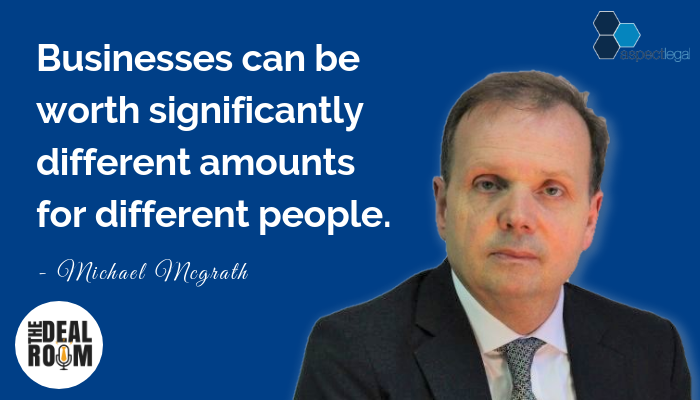
Don’t tell the world you’re considering selling
Joanna: It’s such an interesting fear because I do see this play out a lot. I see a lot of deals become extremely complicated because of that issue.
Why is it? Can you talk to us about the psychology of why? Why don’t you want, at that point, why didn’t you want people to know?
Michael: Well, I mean again we’re going to back in time. So this was 1991. Interest rates were 60 and 70 percent. There was a real cash crunch on, and that stock market crash in 87 had really caught up with the rest of the economy.
Anyone who owned a house back then, their interest rates were 15 percent, 16 percent. Imagine that. Imagine interest rates at 16 percent now.
There was a real cash crunch on and the risks that we were running as a business were quite high. My family, my father and my uncle, had their houses secured against an overdraft. I just wasn’t comfortable with the level of risk we were on.
But I didn’t want staff and management and franchisees to find out we were thinking of selling because you never sell until you actually sign a contract and get a cheque. It could have fallen over.
So I didn’t want to disturb and disrupt what we were building and what we were doing, which is fairly delicately balanced. We didn’t want people thinking there was a problem with the business. I think that’s a very widespread attitude.
Owners don’t want others finding out that they might be considering selling because it’s actually quite destabilising.
Joanna: What’s your perspective on that now though, with many many more years of experience under your belt in this environment? What are your thoughts on it now?
Michael: Well, I think it’s a very valid concern but it needs managing. I think to sell to the person who knocks on the door, the odds of that being the right buyer who’s going to pay the right price on the right terms are quite low. You really need to look at the broader marketplace.
But the concern is valid. So you need to find a way to look at that marketplace intelligently and discreetly without alerting the world to the fact you might want to sell. And that’s one of the things at Oasis M&A.
The founder of Oasis in London, John Wilcox Jones back in 1984, he figured that out. He figured a way of going to a much wider market, but actually not telling that market who the client that he was representing.
In fact, in 85% of our communication with the market, we don’t even tell we’re representing anybody. We’re simply establishing who’s actively acquiring at the moment and we’re establishing what are they looking for. Then we’re measuring that up at a high level with okay, does that match up with our clients asset.
Because very rarely will somebody be talked into buying a business. So you’re really only looking at those people who are actively acquiring, that got capability to acquire. Then what you’re looking at, well what are you looking for.
If they are looking for A, B and C, and you’re E, F G, you really need to close that down. So 90% of the people we go to, when we’re representing a client, we qualify them out without making known that they qualified out. Because actually what they’re looking for is not what our client’s business can give them.
If you press that and pursue that, it ends up not going well. You either get a very lowball price. It’s opportunistic. Or the terms of rubbish. That’s not a good place to go.
But on the other hand, if you’ve got someone who says I’m acquiring, I’m active and I’m looking for A, B and C, and this is why I’m looking for them and that matches up at a high level, now you’ve got a conversation worth pursuing. And maybe at the right stage that might be someone worth revealing the client’s identity to. That’s a much smaller list.
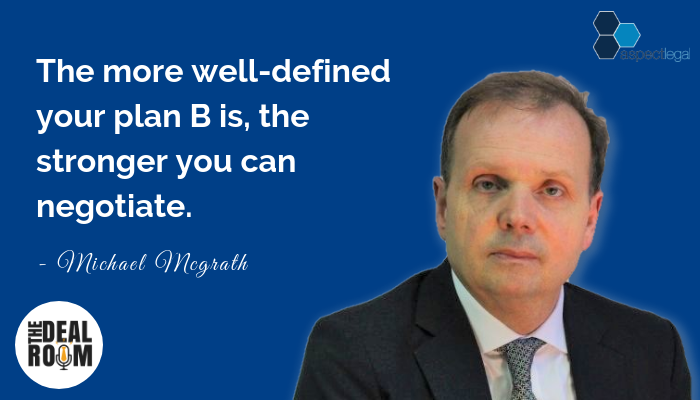
Benefits of getting good representation
Joanna: So if we take that, and you’ve obviously got a far more defined view of how to run this process now than you had back then, you know, the first time you were really seriously involved in the process. What would you have done so practically? What would you have done differently? And actually, how about we start with what you actually did?
Michael: So what I did was I got a knock on the door from Perfect Pizza and I spoke to Russell Smith and the board that we’ve been approached. I told them I wanted to pursue it. Then we ended up having a clandestine meeting in a hotel room.
We kind of broadly agreed terms and sort of finalised those in an offer and went into sort of several months of due diligence and contract negotiations. Then you know six months later we get a deal done.
Joanna: The commercial terms were quite quick basically you’re saying.
Michael: Yeah. And you know, they were the only game in town. There was no competitive tension. We haven’t looked at the alternatives. How do you price the business? Very complicated. Businesses can be worth significantly different amounts for different people.
What we should have done, I think, was hire Oasis in London, which I did several years later when my brother and I were looking to sell a business we owned in recruitment. That was my first engagement with Oasis.
We hired them and we watched them go to work and execute on the process that I just described, and we saw a much better outcome. It was much less stressful. It was organised. It was a very competitive industry.
My brother thought he knew all the players because he was running it. I was a non-exec. He thought he knew everyone. But Oasis kept finding buyers he’d never heard of.
That’s when I switched on and realised what a poor job we’ve done previously. To quantify that, we probably sold it for half what it was worth.
Joanna: Wow. And I wonder if a part of what drives that, you know the psychology that drives that. It’s clear you’re a dealmaker. I can hear that in what you’re talking about. I wonder if the extent to which you know someone’s built a company, they are dealmaker and they just think, well you know I’ve got this. I can do this because I know how to do a good deal. Is that part of the psychology you think?
Michael: Yes, I think so. I think the instinct of an entrepreneur is to be very skeptical of advisers. They’re type A types, type A personalities, strong willed. And that’s worked for them right up until when they start considering an exit. Trouble is if you look at the work around an exit, it’s extremely specialised.
What I say to owners is, when was the last time that you did something for the first time. And that’s really what an owner is doing when he decides to represent himself.
Joanna: Yeah. So true. And going back to yourself then. Cause this question of how should I value the business, I think it’s that initial question that a business owner looking at sale asks. So how did you deal with that at the point that you were of that first sale?
Michael: Well look, the first sale was, they offered us what seemed like a lot of money. It was the only offer we had, and we took it.
Joanna: Yeah right. Okay.
Michael: We negotiated on some of the terms. But we, as a board, took the offer and I think we were too close to it.
We needed a third party to talk to us about similar deals that have been done, similar transactions, similar sorts of circumstances, what sort of valuations will be paid elsewhere. We needed somebody to begin to look at surfacing alternative interest so there was competitive tension. Instead, we kind of gave it away really.
Now, I was 28 at the time. I was very young. Whilst I had a bit of a track record growing a retail business, I have no experience of selling business.
In fact, the people on my board, even Russell Smith, really didn’t. So it was a big dad’s army. And look, we were going in to battle against experienced tough acquirers, who knew how to play the game. That’s just an unfair fight.
In fact, we spend most of our life leveling the playing field for our clients. David and Goliath story really. Because generally you’re selling to a much larger acquirer.
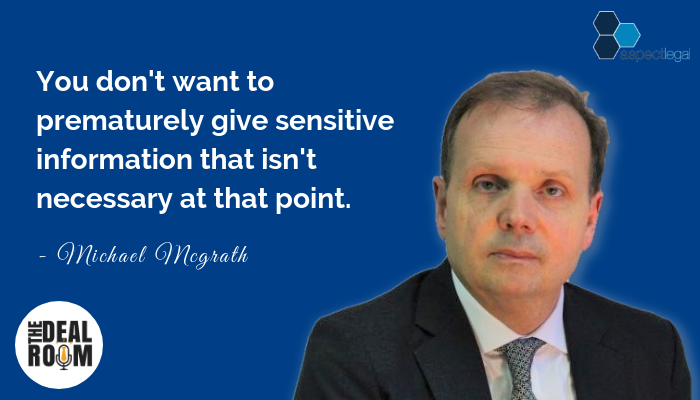
What preparing for an exit is all about
Joanna: Yeah. I guess also just the one area that I also wanted to drive into reflecting back is the preparation of the business for sale. Sounds like this buyer came to you.
So I’m interested in the extent to which you had an exit plan before they came to you and the extent to which you thought about getting your business in, you know, effectively a sale ready state. Was that a thought process at the time?
Michael: Not really. I mean the story is that we built the business very rapidly. We drove headlong into a credit crunch in the late 80s. The banks changed the rules of the game, which they can do any time.
We had to do some pretty clever maneuvering to survive. So we were more in survival mode, serving what we got than you know okay let’s look at clever around the exit.
But we weren’t thinking about an exit really until I had the knock on the door and then I weighed up the option against continuing on and the risk associated that.
The key risk for me was that my father and my uncle had their personal property personally guaranteed against a 750,000 pound sterling overdraft, which I had no quick way of dealing with. And the bank were putting some degree of pressure. That really what was going on for me.
I mean, more broadly, for me preparation for an exit is really just about running the business well, running it in the interests of the current shareholders on all the key measurements. If you do that, then the business is likely to prove attractive to other future potential shareholders.
Building and running and operating a really good business, with a commitment to continuous and never ending improvement is really what preparing for an exit is all about.
Now there are one or two areas which you might consider perhaps a bit more specialists than that. One would be your tax affairs, particularly around structure. So you might want to look at that separately. But you can get an accountant to do that for you.
And probably, if you get into that age where you consider an exit, you might want to have a look at capital expenditure projects that go out three to five years or buying commercial property. Some of that might not be compatible from a time perspective with an exit.
But I think outside of that, you’re really just looking about running the business well and running it safely and securely in your own interests. That includes having your paperwork in good order and making sure leases are in really good shape.
But what I would say is that a good strategic acquirer who is in the trade and has got a higher degree of experience, he’s going to look past some of the curly stuff that perhaps isn’t 100% there. We’ve haven’t yet sold a perfect business.
All the businesses we sold are not perfect. They’ve got certain things that are not in place. But most strategic acquirers are looking past that.
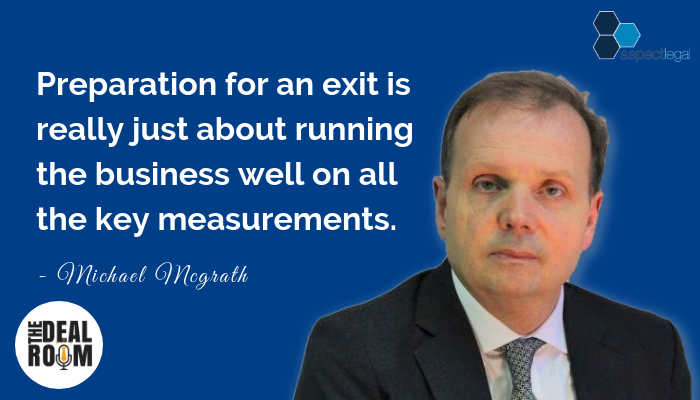
Have a well-defined plan B
Joanna: That’s a good point. Though you’re talking about strategic acquirers here and I guess, implicit in what you’re talking about is somewhere that provides competitive tension.
Because if businesses are in the position where they’re forced into a position where they really feel they need to sell, but you’re in a position where you’re selling to someone who perhaps is going to be more finicky about all of the finer detail, there’s going to be issues for you in that play throughout the deal. Right?
Michael: Yes, I think so. That’s a really good point.
If you’re going to think about selling your business and you’re an owner, you really need to know what your plan B is. A lot of your strength in negotiating the right price and terms. It’s not just price. It’s also terms. The more well-defined your plan B is, the stronger you can negotiate. Whether that’s alternative buyers, which is great, or I’ll just continue running the business.
But in any event, there needs to be a reasonably defined plan B. Having some representation, having some knowledge and experience and great hands around can really help with that I think.
In fact, I think if we had a stronger team back in 1992, we would have bought Perfect Pizza. We were better than them. We were a stronger business on all the fundamentals.
I certainly think that was an option. It was completely out of my orbit at that time. But in fact, with the benefit of experience, that could well have been possible.
Joanna: Such a great example of being too close and not being able to see the bigger opportunity maybe that’s there, at least for consideration. As you say, you didn’t even see at the time. I think it’s a really, such a good example.
I guess just in a few parting messages here. I think it’s pretty clear advice to anyone who’s listening in, to owners or even indeed we have a lot of advisors like for example accountants who listen in to these podcasts.
So is there anything in summarising your experience in that I guess sale number one versus sale number two for you that advisers and businesses who maybe find themselves in this situation at the moment should be looking out for?
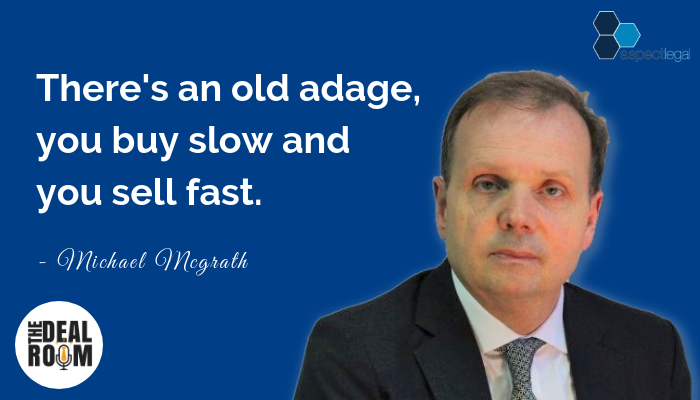
What to look out for when selling a business
Michael: Yes, I think you got to not necessarily avoid selling to the guy who knocks on the door, but you’ve got to look at considering a wider market than that. But you’ve also got to do that discreetly and intelligently.
I think if you can do that, you increase your odds of getting a better price and terms. So we would say go wide. But make sure that that’s done discreetly and that the world and his wife don’t discover that you might be for sale because it is very destabilising.
Getting good representation from people who know what they’re doing and have got a track record and understand your sector and your business. I mean they don’t have to go run the business. But they do have to know what’s going on in that sector.
I think putting somebody between you and the buyer can be quite useful. So you maintain control, but you don’t necessarily get too involved too early, particularly while qualifications are going on. That’s the biggest single error we see, is the vendors get too involved with the buyer too early.
It starts out very nicely. You’re great. We’re great. The world is great. We call it tea and cakes. But that doesn’t mean they’re going to buy the business. You need to move into qualification mode, rather than let that just play out. Often we see people getting involved in premature due diligence effectively.
So what you’re seeking, if someone approaches you, what you’re seeking is, as early as possible, some non-binding indicative price and terms. What are you proposing?
The quicker you can get to that, even if it’s subject to due diligence, subject to contract, subject to the weather, you need something in black and white. And what we see is buyers saying “Ah, we’ll get to that later. But here is a big list of information we need.”
Well actually, if you’re experienced and you know what you’re doing, you don’t need that much information to provide a term sheet or an indicative offer. You need not, because only then will you know whether the guy is in the ballpark. If he’s in the ballpark, then you can move to the next stage.
Whereas what you don’t want to be doing is prematurely giving sensitive information away that actually isn’t necessary at that point. We would think that’s a key issue and a key problem we see being played out time and time again. Sometimes it can take six to nine months.
There’s an old adage, you buy slow and you sell fast. So if you’ve agreed terms and you’ve got a buyer and you’re happy with it, get it done. If you’re buying and we work on the buy side, buyers are slowing the whole thing down. They’re getting more and more information. They’ve got other deals that they’re looking at. It ain’t nothing happening till it’s happened.
So why would you give up sensitive commercial information, like lists of customers is a classic. You did 10 million dollars last year, can you give us a list of who your customers were. No! No!
Maybe types of customer, maybe customer blinded with numbers or ABCD. You gotta establish what are they achieve by asking for that. They’re trying to achieve what’s the concentration of revenue like. You can give them without giving them names of the customers.
I could go on and on. But that’s a key issue. Don’t lift the bonnet when you don’t need to.
Joanna: Well I tell you what Mike, you have given us such a fabulous overview, not just of your own experiences. I do like to drive into experiences of people who have been there and done that because I think quite often providing advice in a vacuum without having done it is a different experience to people who’ve really been there and felt the pain and in hindsight can see what they can provide to their clients moving forward that helps to fill the gaps that they had initially.
It’s been such a great walk through your background story. I’m really looking forward to have you on again, so that we can hear a bit how Oasis deals with their clients and your approach that’s a little bit different.
Michael: Sure.
Joanna: Thank you so much for coming in. I’m looking forward to having you back on Episode 2.
Michael: Pleasure.
Joanna: That concludes the first half of our two-part series with Michael Mcgrath of Oasis M&A where we talked all about Michael’s own experience on the ground as someone who has built and sold his own business. We also drilled into the psychology of a dealmaker and what it really means to prepare for exit.
I hope you enjoyed today’s episode. If you did, please join us again next week for part 2 with Michael where we’ll take a closer look at how Oasis works and their unique approach to dealmaking. If you’re not already subscribed to The Deal Room, make sure that you do. It’s super easy! Just head over to Apple Podcasts or your other favorite podcast player and hit the subscribe button for The Deal Room podcast in order to get notifications straight to your phone whenever a new episode is out!
Thanks again for listening in! This has been Joanna Oakey and The Deal Room podcast, a podcast proudly brought to you by our commercial legal practice Aspect Legal. See you next time!
Our Business Sales and Acquisitions Services
Aspect Legal has a number of great services that help businesses prepare for a sale or acquisition to help them prepare in advance and to get transaction ready. And we’ve also got a range of services to help guide businesses through the sale and acquisitions process.
We work with clients both big and small and have different types of services depending on size and complexity. We provide a free consultation to discuss your proposed sale or acquisition – so see our show notes on how to book a time to speak with us, or head over to our website at Aspectlegal.com.au
Disclaimer: The material contained on this website is provided for general information purposes only and does not constitute legal advice. You should not depend upon any information appearing on this website without seeking legal advice. We do not guarantee that the contents of this website will be accurate, complete or up-to-date. Liability limited by a scheme approved under Professional Standards Legislation














